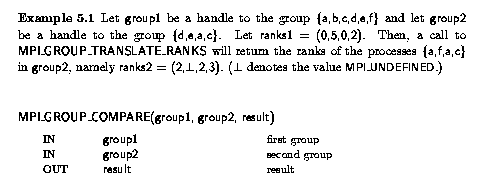
MPI_GROUP_SIZE(group, size)
IN group group
OUT size number of processes in group
MPI_Group_size(MPI_Group group, int *size)
MPI_GROUP_SIZE(GROUP, SIZE, IERROR)INTEGER GROUP, SIZE, IERROR
MPI_GROUP_SIZE returns the number of processes in the group. Thus, if group = MPI_GROUP_EMPTY then the call will return size = 0. (On the other hand, a call with group = MPI_GROUP_NULL is erroneous.)
MPI_GROUP_RANK(group, rank)
IN group group
OUT rank rank of the calling process in group
MPI_Group_rank(MPI_Group group, int *rank)
MPI_GROUP_RANK(GROUP, RANK, IERROR)INTEGER GROUP, RANK, IERROR
MPI_GROUP_RANK returns the rank of the calling process in group. If the process is not a member of group then MPI_UNDEFINED is returned.
MPI_GROUP_TRANSLATE_RANKS(group1, n, ranks1, group2, ranks2)
IN group1 group1
IN n number of ranks in ranks1 and ranks2
arrays
IN ranks1 arrray of zero or more valid ranks in
group1
IN group2 group2
OUT ranks2 array of corresponding ranks in group2
MPI_Group_translate_ranks (MPI_Group group1, int n, int *ranks1, MPI_Group group2, int *ranks2)
MPI_GROUP_TRANSLATE_RANKS(GROUP1, N, RANKS1, GROUP2, RANKS2, IERROR)INTEGER GROUP1, N, RANKS1(*), GROUP2, RANKS2(*), IERROR
MPI_GROUP_TRANSLATE_RANKS maps the ranks of a set of processes in group1 to their ranks in group2. Upon return, the array ranks2 contains the ranks in group2 for the processes in group1 with ranks listed in ranks1. If a process in group1 found in ranks1 does not belong to group2 then MPI_UNDEFINED is returned in ranks2.
This function is important for determining the relative numbering of the same processes in two different groups. For instance, if one knows the ranks of certain processes in the group of MPI_COMM_WORLD, one might want to know their ranks in a subset of that group.

MPI_Group_compare(MPI_Group group1,MPI_Group group2, int *result)
MPI_GROUP_COMPARE(GROUP1, GROUP2, RESULT, IERROR)INTEGER GROUP1, GROUP2, RESULT, IERROR
MPI_GROUP_COMPARE returns the relationship between two groups. MPI_IDENT results if the group members and group order is exactly the MPI_IDENT same in both groups. This happens, for instance, if group1 and group2 are handles to the same object. MPI_SIMILAR results if the group members are the same but the order is MPI_SIMILAR different. MPI_UNEQUAL results otherwise. MPI_UNEQUAL